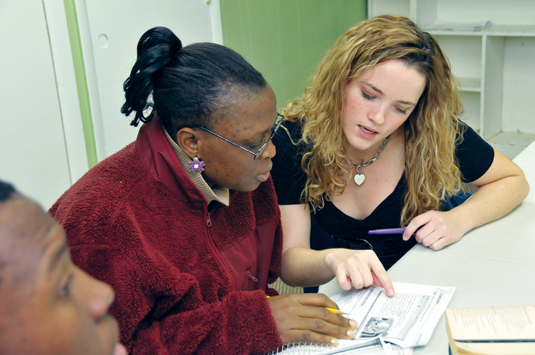Student volunteers help recent immigrants shine

(right), a
sophomore
SHINE tutor and
coordinator, works
with learner
Berlyne Laurette
at the project’s
Wyoming Baptist
location.
It’s been said that America is a nation of immigrants. However, many recent arrivals to the U.S. experience social isolation due to a language barrier and the disorientation that can come with being transplanted to a new environment.
For more than 25 years, Temple’s Intergenerational Center — part of the College of Health Professions and Social Work — has been helping the nation’s newest settlers overcome these obstacles through a series of programs known today as Project SHINE (Students Helping in the Naturalization of Elders). Founded in 1985 by center director Nancy Henkin, the non-profit organization connects student volunteers with older immigrants to help them learn English and become engaged citizens. The program has since become a national model for intergenerational partnerships, expanding to other colleges and universities throughout the U.S.
Students spend two or more hours each week over ten weeks tutoring immigrants at one of 20 locations throughout Philadelphia. The program is a lifeline for non-English speakers, who are often cut off from neighbors and even younger family members who do not speak their native language.
“It’s really great that [immigrants] are getting out of their bubbles, leaving their apartments and getting to know people they would never meet otherwise,” said Jessica Kratzer, an AmeriCorps VISTA volunteer and program coordinator for Project SHINE Philadelphia.
The program is part of the Community Learning Network; students volunteer as part of their service learning classes. Some want to learn about other cultures, others are immigrants themselves and just want to lend a helping hand. Whatever their reasons, Temple’s SHINE volunteers are undeniably passionate.
“We have a core pocket of dedicated students,” said Kratzer. “(Many) stay for a long time — all the way to graduation.”
Katie Durkin is a sophomore SHINE tutor and the site coordinator at the program’s Wyoming Baptist Church location. A Spanish and secondary education major, she began working with the SHINE program during her first semester at Temple.
“I thought it would be a great opportunity to help the community and strengthen my Spanish skills,” said Durkin, who as a high school student got a taste of the challenges immigrants face during a six-month study abroad experience in Honduras.
“I know what it’s like to be in a foreign country and not know the language,” she said. “I just wanted to help others assimilate to life in the U.S. like many people in Honduras helped me.”
Many volunteers take their commitment to another level. Field trips are not uncommon — whether to an ethnic grocery store or even to Dorney Park. One student helped a learner locate family members who had settled in another state.
Tutors must be sensitive to other cultures — some classes take place inside a mosque, for example, where there are strict codes for dress and behavior. However, the age difference between the student tutors and adult learners is seldom an issue, said Durkin. Learners, who range in age from their 20s to their 70s, enter with different levels of knowledge of English — some know five words; others can speak the language but not write it.
“The most challenging part of working with ESL students is not knowing how to explain why we do certain things in the English language,” said Durkin, adding that some tutors use props or pictures to help explain difficult concepts.
But the learners aren’t the only ones who benefit from the sessions — volunteers learn a lot about themselves and other cultures. Some have picked up new languages from their learners; others have learned Tai Chi or how to paint Chinese calligraphy.
“SHINE tutors can also learn a lot about English by teaching it,” said Durkin, who noted that her work with SHINE has changed her perspective on immigrants, and illegal immigrants in particular. “I found out that they lead very typical lives,” she said.
One of Durkin’s learners, a Chinese immigrant, expressed how pleased she was with her SHINE experience: “I (very much enjoy) Katie's teaching,” she wrote. “If I didn't understand anything she found it (on her computer) or showed me the picture. She went to library early, she (found ESL books) … I got one at home to study and do the exercises. She lights me up!”
It is experiences like this that keep SHINE tutors coming back. Indeed, Durkin intends to continue her volunteer work.
“The most important thing is creating relationships with your learners,” said Durkin. “It is by far the most rewarding part.”
— Elizabeth DiPardo